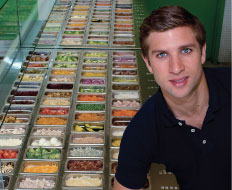In 1975, as a 17-year-old kid in Point Pleasant, New Jersey, Peter Cancro wasn’t even old enough to legally slice a sub. But that didn’t stop him from embracing his ambition and love for the fast-food industry.
That year, Cancro purchased his first Mike’s Subs shop. He later built the brand to several units, began franchising, and eventually turned it into Jersey Mike’s Subs. Cancro is now the CEO of Jersey Mike’s Franchise Systems and oversees more than 600 locations that are open or in development.
Having this type of passion and energy is one major advantage young leaders possess today, and they’re attributes necessary to be successful in the grueling quick-service industry, Cancro says.
“That is what people don’t get,” he says. “You have to be on your feet every day, going after it at a quick pace. You have to have that enthusiasm, that pace about you to really do well.”
Matthew Corrin, founder and CEO of Freshii, was just 23 when he developed the healthy food concept in 2005. Corrin says inexperience can be a benefit at times for a young quick-service entrepreneur or leader. “If you don’t know anything about the business, you look at it with a totally clean slate,” he says.
But there’s a fine line between having a fresh perspective and being blinded by inexperience. As Corrin puts it, young quick-service entrepreneurs typically “don’t know what they don’t know.”
“If you go in thinking that you know everything, you for sure are going to be busted out of the business,” he says. “If you go in knowing that you don’t know what you don’t know, then you are going to be incredibly inquisitive.”
Happy Asker, founder and CEO of Happy’s Pizza, a Detroit-based chain with 100 units largely concentrated in Michigan, opened his first store when he was 18 years old. He says young leaders in the industry need to be patient, adding that mastering a concept’s menu may take years. “Putting together the right staff, the right quality, and the security measures” also takes time to perfect, Asker says.
Though he established his strong work ethic working for his family’s supermarket business, Asker says, his willingness to take risks helped him become a success in quick service.
While an appetite for risk-taking is at its highest when young, the self-awareness that’s needed to develop management skills and a management style may be missing, Cancro says. “It’s recruiting dynamic, outgoing, energetic people. That is what it takes in our business,” he says. “Do you have what it takes for people not to work for you, but with you?”
While young entrepreneurs are often full of enthusiasm, drive, and a desire to learn, Cancro says, they’re typically “green” in the business. From real estate dealings and understanding demographics to menu development and building capital, a lack of business acumen can be treacherous for the young entrepreneur getting started in fast food.
In addition, Corrin says, young leaders may tend to appear brash or cocky when dealing with older professionals in the business. As a result, they should pay close attention to the way they handle themselves in business settings. “You go in there with a little bit of swagger and being confident and knowing what you are talking about, but you run the risk of someone sitting across from you calling you arrogant,” he says. “Sometimes you can use the young card and it works for you, and sometimes you need to know when to roll over.”
Fortunately, the perception of working in the quick-service business has improved over time, Cancro says, making it more attractive to young, would-be entrepreneurs. “Now we are getting people to go into the culinary schools. They are learning the profession and they understand the industry,” he says. “You talk to a lot of managers and people in different restaurant concepts, and their goal and dream is to get their own place, their own business.
As a result, young quick-service leaders no longer have to learn the trade through trial and error, Cancro says. “I probably made every mistake in the book that you can make, but you don’t have to do that,” he says. “I always profess that you don’t have to go down and make mistakes to really learn.”
To gain experience as a young leader, Corrin says, it’s important to learn from the best. When he was starting out, he would regularly listen in on conference calls of publicly traded companies. “I got in the habit of thinking like a public company thinks and tried to act like a public company and guess how a CEO would answer a certain question,” he says. “Then we tried to apply that to our business.”
If possible, it’s also helpful to work under someone in the industry for a number of years, Cancro says. “Go to work in the business first; see if you like it, see if it is your passion,” he says. “You have to love to work for other people first and be subservient and to be a leader by example. Don’t push people, but pull them along. In our business, that is how it works.”
For Asker, the success of young entrepreneurs comes down to three simple ingredients.
“If you work hard, give good service, and keep a clean restaurant,” he says, “you’re putting your time in for success.”










